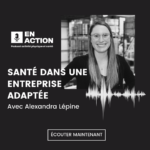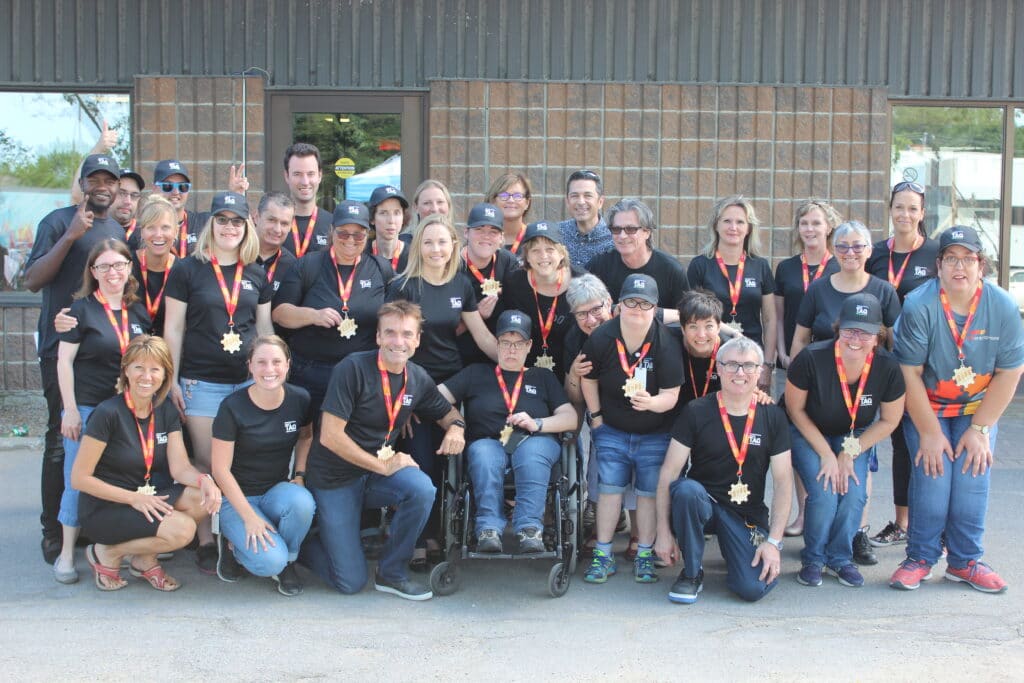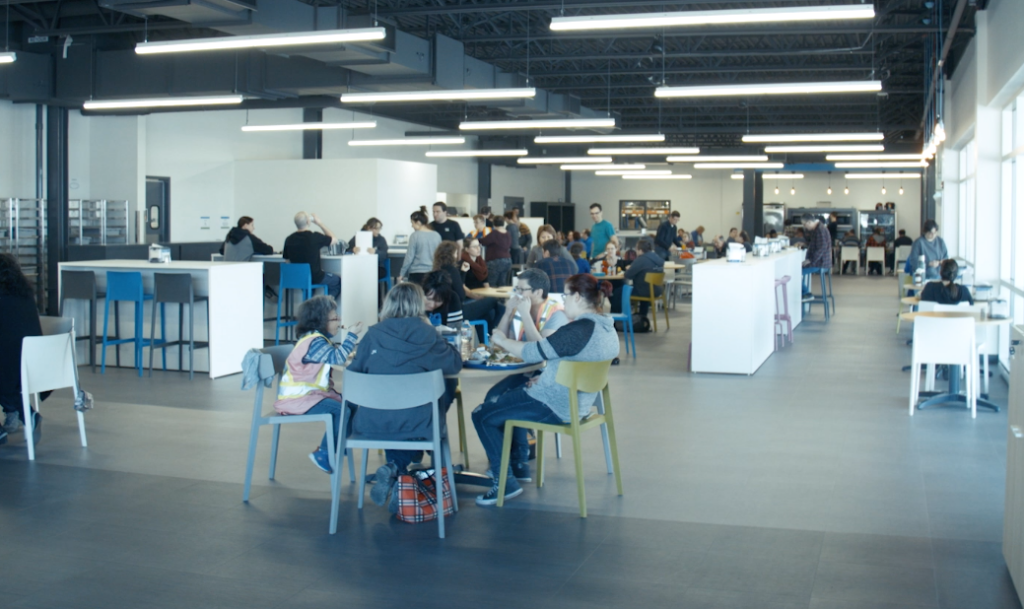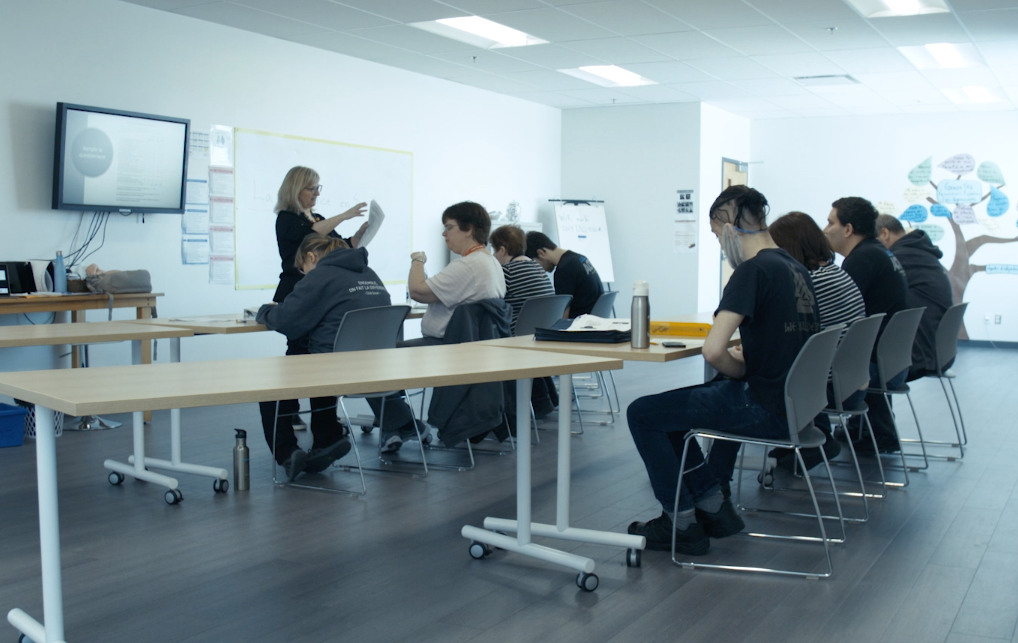
In companies, it is often a complex task to promote health. Engage leaders, consult with employees, create a plan, execute it, and evaluate the results. It's already a challenge in a conventional company, so it's quite a challenge for an adapted company!
That's why I spoke with Alexandra Lépine, Director of Communications at TAQ Group. Groupe TAQ is an adapted company employing more than 450 people, 70% of whom live with a functional limitation, while being able to work.

Daniel: Can you tell us a bit about Groupe TAQ?
Alexandra: Groupe TAQ is an adapted company, our mission is to create jobs for people with disabilities. Our workers are people with different functional limitations. We wanted to create a great work environment for them.
Often these people have had difficult experiences with their previous jobs. You really see them grow and develop over time and it's very rewarding.
Daniel: What place does health promotion have at Groupe TAQ?
We are already registered for the Business Challenge! For us, it's a great activity and during the last edition, more than 70 employees took up the Challenge. There are some who have done the Challenge for running, walking or in an adapted wheelchair!
It must also be said that our Managing Director is passionate about physical activity. He has completed the 1000 km of the Grand Défi Pierre Lavoie several times, raising funds for specialized schools.
We also have a gym for the members of the support team, which is very appreciated by the team.
But health isn't just about promoting physical activity. We offer more than 125 employees the opportunity to register for social integration training with our partner, the Center Louis-Jolliet. Training is offered on various subjects: conflict management, interpersonal skills, know-how, management of personal social media. It's really training with the objective of developing the autonomy of workers.
We have also had a cafeteria for 2 years that provides meals for less than $5 each day and offers a complete and healthy meal. This is now a big plus, because we had noticed that it was difficult to buy a good grocery store. Besides great food, it's a nice hangout area. Moreover, there is a piano in the middle of the cafeteria and an employee plays there at each break.

Daniel: What are the challenges you face when promoting health in the workplace?
Alexandra: For us, it is always absolutely necessary to create a committee. It's always a little more complex and the actions require a more specific organization. For example, for the Défi Entreprises, I will make a summary of the website and send it in paper format to the workers.
We cannot, for example, ask workers to register online, so often registrations will have to be taken manually.
We also hold information meetings, to explain to workers how to get to the event, where to park, what to bring, etc. Each time, it's so rewarding to see the workers so proud. The photos we have are jewels!

Daniel: Health promotion must be even more important to you than in a conventional company because you have a mission of developing people.
Alexandra: Yes, but I want it to be like that in all companies, because our employers give it back to us. When they come to work, they are well, they develop. It's a really good investment. In every business, we should be the best version of ourselves.
Daniel: If you had one piece of advice to give to a company that wants to promote health, what would it be?
Alexandra: It's the leaders' commitment. Here, we really have a lot. Then there is the creation of the committee. We also suggest taking it slow, taking it one step at a time. It is also important to confirm interest in the activities set up.
My last piece of advice would also be for the employer to get involved by paying part of the registration fee for an event or activity.
Finally, we must also remember why it is important to promote health: yes, it's good for your health, but it also allows you to create links. It has a major impact on our working climate, on our team cohesion. It allows you to develop more personal than professional links. One of the reasons why people stay in a job is their colleagues. It is certain that promoting physical activity will help employee retention.

Daniel: How do you do your communications in connection with your activities?
Alexandra: We use our televisions to send messages about current activities. For the Défi Entreprises, we also print out registration forms and leave them on the tables in the cafeteria.
For the support team who has access to a computer, we will send emails. Human resources, which includes 2 integration agents, will be informed and involved in order to get the messages across.
Once the registrations are made, there, we will have information meetings related to the day of the event or the progress of the activity.
Daniel: Your solution is to offer fewer activities, but to put more energy into each one?
Alexandre: I see it like that, especially at the beginning of the committee. This creates ambassadors and a positive experience for everyone.
Daniel: What are the next steps for Groupe TAQ?
Alexandra: In the next few months, there are still 400 to 800 people who are able to work, but who don't have one. Our next step is to create a new company adapted to St-Raymond to be closer to our staff.
The needs are so great, so we are committed to promoting job creation for people with disabilities.
Daniel: Is it also part of the solution to fight the labor shortage?
Alexandra: Absolutely, our partners are growing and we want to be able to support them in this growth.

